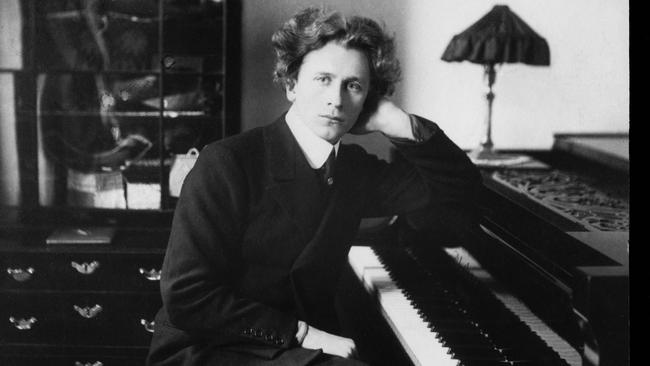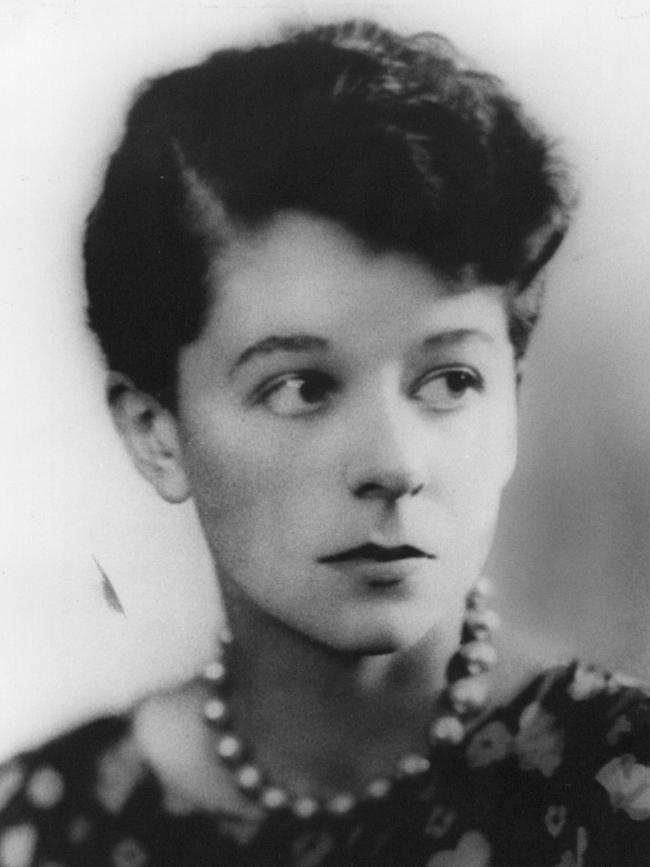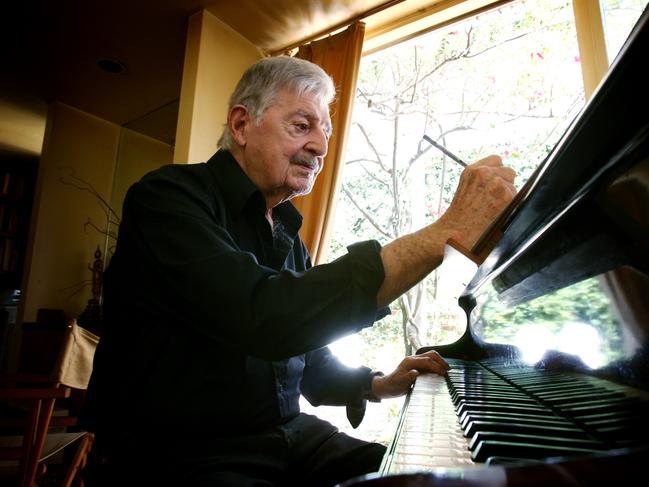Decline in Australian music studies a new cultural cringe
The nation’s musical history is being marginalised by Australian academics.

Last June, more than 1000 students and staff from Melbourne University’s Conservatorium of Music moved into their impressive new home, the $109m Ian Potter Southbank Centre.
This sleek building is in the heart of Melbourne’s arts precinct and is equipped with facilities including a 400-seat cantilevered auditorium, a studio and rehearsal spaces. At the time, the university’s faculty of fine arts and music dean, Barry Conyngham, boasted: “With a student cohort that has increased by two-thirds since 2010, the new conservatorium will allow us to teach, rehearse, perform and record like never before.”
Melbourne’s music facilities may be state of the art, but some academics say a crucial element of the curriculum — the nation’s musical history — is being marginalised at this and other prestigious campuses. Suzanne Robinson, an author and former music lecturer, says that at many leading universities, the teaching of our national music history — from influential classical composers such as Percy Grainger and Peggy Glanville-Hicks to the evolution of local jazz and folk — has been downgraded so much that “we are not producing students who have any idea of even the most basic outline of Australia’s music history, how national identity has been formed through music, or how it has contributed to Australian culture generally. PhD students start work without awareness of the broader history, the literature (and) the key issues.”
In the mid-1990s, Robinson was a lecturer at the University of Melbourne’s Centre for Studies in Australian Music, which ran several large, well-funded research projects, produced CDs, engaged a full-time lecturer and other academic researchers, and ran an Australian-focused music publisher, Lyrebird Press.
Despite soaring student demand for music courses at Melbourne, that centre no longer exists. Robinson says that, last year, “we relinquished the building and its archive”. All that remains is the press, where she still works as a series editor. She adds that a compulsory subject on Australian music history was ditched at Melbourne in 2015. Now, she says, Australian content is threaded through other subjects on say, indigenous culture, opera or the history of female composers.
Peter Tregear, principal fellow at the University of Melbourne and head of the Australian National University’s School of Music from 2012 to 2015, agrees Australian music-studies academics have witnessed “a landscape of decline” since the 1990s. He attributes this to a dearth of research grants from the Australian Research Council; a lack of advocacy; too few dedicated subjects and lecturers specialising in Australian music history and — more contentiously — some academics’ ideological objections to studying the music of “dead white (Australian) men, as if that were all there was to our musical past”.
He says: “It is acceptable (within universities) … to say ‘well of course we’re not going to study Australian music because it’s largely written by dead white men and because it might not reflect Australia as we find it today.’ Simple as that, out it goes.”
This amounts to a new academic cultural cringe: “We’ve gone sort of full circle. We’ve gone from being embarrassed about our past to, well, being embarrassed about our past.”
He says that despite “an enormous global resurgence of interest” in the music of Australian composer Percy Grainger, he is a neglected figure at home. “I wouldn’t be surprised (to find) among my colleagues a certain amount of eye-rolling … basically because he’s seen to be merely eccentric. Sure, there are problematic political and other views that he held, but instead of that being the starting point for enriching our thinking about Australia’s musical past, it becomes a cover for what actually is an old- fashioned cultural cringe.”
He reels off the names of other Australian composers who he claims are also overlooked by universities including Glanville-Hicks, John Antill, George W Marshall-Hall, Roy Agnew, Raymond Hanson and Mirrie and Alfred Hill. He says the role of universities is “to be custodians of our past, as we find it”. To deny our relation to indigenous music culture — which was overlooked in the past — or to western popular and classical music, was “a willed stupidness”.

Tregear and Robinson are raising their concerns at a time when academics specialising in Australian history and literature claim that their research is chronically undervalued within a university system that ties career progress to publication in international rather than national journals. (International publications attract more citations, and boost university rankings, which universities then use to market themselves.)
Last October, the University of Sydney was widely criticised after it defunded its chair in Australian literature — the nation’s oldest Ozlit professorship — while it looks for a private donor. Publisher Michael Heyward called the move a “shocking betrayal of readers and writers”.
Robinson says the academy’s bias towards international publishing is “absolutely” a problem for Australian music historians, while Tregear agrees Australian specialists across music, literature and history are effectively being discriminated against.
He says that in the field of local music studies, there is a dichotomy between a leftist world view seeking to “avoid promoting certain areas of study in an effort, say, to ‘decolonise the curriculum’ ” and a neoliberal idea, advanced by university administrators, that “we’re not gonna study something that’s not going to make money”. He warns that “the full richness of Australia’s musical past (especially prominent women) gets lost between those two ideological trenches”.
Senior staff at Sydney and Melbourne universities strongly reject Robinson’s and Tregear’s criticisms.

Matthew Hindson, deputy dean at Sydney University’s Conservatorium of Music, says the college offers two Australian music subjects: one on popular music and another, called Australian Musical Worlds, which includes historical and ethnographic approaches. The conservatorium lacks a stand-alone subject on Australian classical music history, but Hindson says one will be introduced for fourth year or postgraduate students from 2021 or 2022. “I am proud to say that the study of Australian music is integrated into all of the music programs at the SCM — classical, jazz, contemporary, composition, digital music, music education — both from the teaching and research perspective,” he says.
He adds that conservatorium staff are “actively researching this area”, and working on projects including pioneering Australian female composers, the reception of Peter Sculthorpe’s work, and Aboriginal country and western music of the 1950s. “Australian music history is important to us … It is part of our responsibility as Australian institutions,’’ he says.
He says one development in music departments “is that the contributions of people who weren’t white men are being recognised’’. No academic colleague “has ever said to me that because someone’s a dead white man, we shouldn’t look at him’’.

He also points out that the internationally celebrated Australian composer Liza Lim was last year appointed as the inaugural Sculthorpe Chair of Australian Music, following a bequest by the late Australian composer. This historic appointment occurred at the same time as the Sydney University Ozlit chair controversy: “As one door closed, another opened,’’ he says.
Lim, whose works have been performed by the Cologne Opera, the Los Angeles Philharmonic and Bavarian Radio Orchestra, also disputes that Australian music studies are neglected.
“I don’t think this is an issue of concern … As far as I know, all music institutions are committed to teaching and research in Australian music in its creative practice, history and cultural contexts.’’ The University of Sydney, she says, “has always been a leader in research on Australian music and in particular, indigenous music.’’
Sydney, Melbourne and Queensland universities all offer dedicated subjects on indigenous Australian music but the latter two institutions do not offer dedicated subjects on Australia’s non-indigenous musical history.
Another prominent academic, who did not want to be named, echoes Tregear’s concerns about “cultural cringe’’, adding: “In Western Australian (universities) the coverage of Australian music is pretty dismal.’’ The academic says research in the field has increased over the past three decades but this has not filtered down to the teaching of undergraduates.
The University of Melbourne’s Barry Conyngham says the university axed its compulsory Australian music course in 2015 because “we decided it was too token and we wanted to mainstream Australian content … You can’t go and look at something called Australian music anymore because it’s everywhere (embedded in general subjects)’’.
His university has five Australian composers on staff, plus an associate professor who specialises in feminism and the music of Peter Sculthorpe; he also says Grainger has featured in several PhD and masters theses. He concedes some academics “would like to see more focus on (Australian music history) in the undergraduate program’’ and that it is “technically possible’’ for a music student to graduate from Melbourne with only a “basic’’ knowledge of Australia’s musical past.
Then again, he says, Melbourne’s Bachelor of Music is a practical degree focused on performing and composing. As a composer, he had to overcome the cultural cringe of the 1960s and 70s and he feels that today, “more attention is paid to Australian music than at any time in my lifetime’’.
Robinson counters: “With Australian studies so ad hoc we’ve barely scraped the surface of the history of music-making in Melbourne (and even less so of the other cities). Grainger studies are few and far between despite a whole museum worth of archival material. There are hugely neglected composers (especially women) and most forms of amateur music-making (including jazz) have received only scattered attention.’’
Robinson’s biography, Peggy Glanville Hicks: Composer and Critic — a meticulous account of the Australian composer who built a flourishing career in the US in the 1950s and 60s — was published last year. Tellingly, it was published by the University of Illinois Press rather than an Australian academic press.
For Tregear, the current neglect of Australia’s musical past by universities is reminiscent of the 1950s cultural cringe: “We’re back to a situation where art (or serious) music is something that happens to other people,’’ he says, laughing incredulously. “It doesn’t happen here! So we become deaf to the historical record.’’

